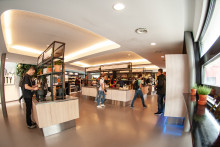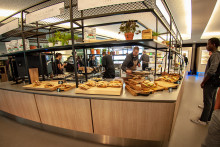The collaboration with Greendish, an ‘expert in sustainable food’, is for one year, with the intention to extend. ‘The UT has goals, which we must achieve. This collaboration will help to realize a food offering that fits within the limits of what our planet can handle’, explains Birgit Dragtstra, environmental and sustainability employee at Campus & Facility Management.
Baseline measurement
Those goals include a lower carbon footprint with standard vegetarian work lunches, as recently introduced. But also reducing the CO2 footprint of food by fifteen per cent in 2023. ‘To achieve this, employees of caterer Appèl can follow training courses via the Greendish Academy, to gain more knowledge about sustainable food and to apply that knowledge.’ In addition, a ‘baseline measurement’ has been taking place in the canteens on campus since last week. ‘Not only to register what the offer is, but also which products are sold the most, for example. Measuring customer satisfaction through a survey is also part of this’, says Dragtstra.
First changes from December onwards
After the baseline measurement, Greendish makes a first impact report. The parties will meet in November to consider what kind of ‘interventions’ can take place in the canteens. ‘People can expect the first changes in December and January’, Dragtstra announces.
But the change in the food offering will not be radical. ‘It is not that we insist that the offer has to be vegetarian or vegan as standard and that the kroket suddenly disappears by definition. People have to keep their options because we also want to maintain or even improve customer satisfaction’, says Dragtstra. ‘We can achieve a lot with small changes, while guests still keep freedom of choice in the restaurant. Suppose the pasta Bolognese sells well, then at some point, there could be less minced meat in that dish, while it remains tasty. Or that we stimulate people to choose the more sustainable options.’
Contract
Shouldn’t the UT move faster towards vega(n), instead of these small steps? ‘Even if we would like to, we have a contract with Appèl, which has been tendered, and it will run for a few more years,’ Dragtstra explains. ‘Sustainability was included as a condition in that tender. Appèl itself is also already working on this. But we cannot change the rules of the game while the contract lasts. Appèl is happy to cooperate and this collaboration can only stimulate that further.’






